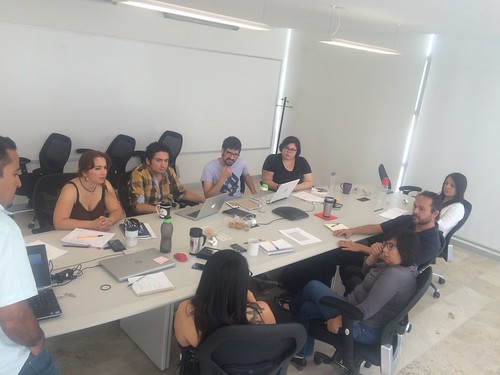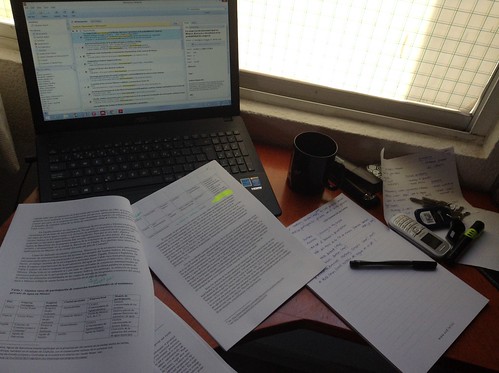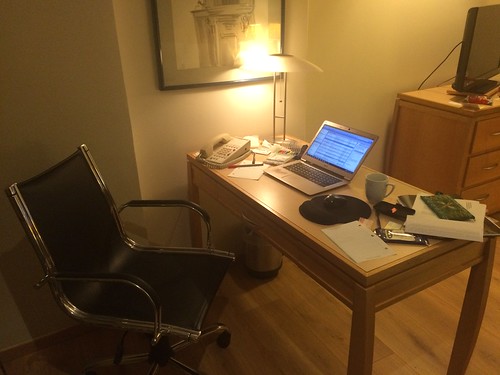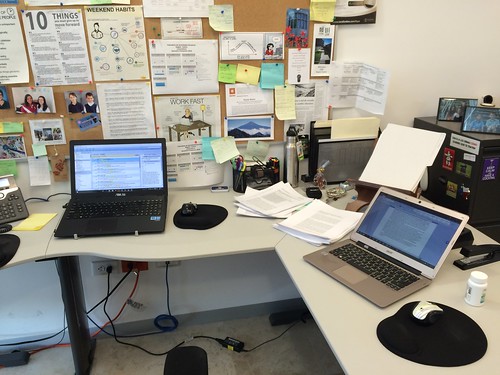One of the reasons people with whom I talk to gets frustrated is because they can’t find the time to write, and they ask me how I can write for 2 hours every morning. Well, turns out, some days (luckily not EVERY day), I am so busy with administrative and busywork that I just have to maintain a “2 hours of research in the morning” strategy to keep me afloat. Instead of getting frustrated because I can’t put words on a document (though, do check my posts on getting your academic writing unstuck and my 5 “prompt” strategies to get some words out). I still keep with my “no email before noon” rule, and my “no meetings before 11am” rule, but at least I can count on the fact that I can move forward with my research.
What factor do you find slows down your scholarly progress on an everyday basis?
— Dr Raul Pacheco-Vega (@raulpacheco) July 13, 2017
I have spent the better part of the first three days of this week in meetings after two weeks of travelling (one week in Singapore at the International Conference on Public Policy, ICPP3, and one week in Valle de Bravo, at a workshop with policy makers on water governance in Mexico, and right now I’m at a workshop on conflicts in extractive industries). This is perfectly normal as I’m in the midst of deploying a large team of researchers and research assistants to undertake fieldwork for my project on water conflicts in Mexico. But it was a tad frustrating. Three. Full. Days. Of. Meetings.
I’m growing used to this. I’ve transitioned from the “early career scholar” stage of my career to the point where I am managing a full lab, coordinating a large grant-funded project, and collaborating with a dozen coauthors in different papers and various projects. But managing a research team is really taking a toll on my actual “scholarly time”. Not entirely “senior professor”, but senior enough. While before I could spend ALL DAY reading, highlighting, scribbling, annotating, looking at datasets, running models, transcribing interviews, now I need to spend A LOT OF TIME simply managing research – looking at and signing contracts, negotiating budget lines, making decisions on equipment purchases, etc. Even though I have an amazing team of research assistants and a fantastic research manager, I *still* do a lot of administrative stuff.
Building habits that help me do rigorous research and continue publishing even under adverse circumstances has been very hard, but also something that I’ve needed to learn how to do. I’m someone who has so many interests that I often get distracted, so I had to build strategies to regain focus. I had to learn how to Move Every Project Forward Every Day so that I could make a little progress on everything I have on my plate. Despite the fact that I’m really well organized and I plan my entire year every December, there’s always something that can potentially derail me. Thus, I have learned to be content with myself when I’m so overworked that I can’t write 2 hours every day, and be just happy that I have 2 hours of research time every morning.
Despite my increased service and administrative workload, and my travel schedule, I’ve continued my routine of waking up early every morning and maintain a “2 hours of research” policy even if I can’t do my usual “2 hours of #AcWri academic writing” every single day. I try (but I’m not always successful) to write generative text, but I still read at least two academic journal articles each morning. I’ve done a few edits to three of my research papers (an activity that definitely should count as academic writing). I have been planning the data collection strategy for my bottled water project. This doesn’t mean I’ve been able to write for the entire 2 hours I block for my #AcWri, but it does mean that I still have 2 hours of research every single morning.
These past few mornings, even if I haven’t written 2 hours consistently every day (some days I’ve been able to), I have been thinking about which changes I’m going to have to make in an R&R and two recently rejected papers. I’ve been drafting notes to myself regarding my expected scholarly output and deadlines for the fall. Maybe I haven’t written for the entire 2 hours, but I’ve definitely done 2 hours of research every morning, before I need to head to campus to deal with administrative and managerial tasks.
Again, this is quite important. Do what works best for you under the circumstances. You can’t follow the “Write Every Day” mantra if you’re always running against the clock (though I hasten to add, my friend Jo Van Every believes, and I concur with her, that even 15 minutes of writing every day can help you move forward – take her 15 Minutes #AcWri Challenge!)
Using the “book 2 hours for my research every morning” strategy allows me to stop worrying about the scientific and technical component of a project and start using that time to think through my research. Yes, in an ideal world, I’d be able to write every morning for the entire 120 minutes period. But sometimes my body doesn’t respond that way. Nobody’s body does, despite building routines, I think. Thus, in closing, I do not believe we should berate ourselves if we can’t write generative text every day.
If we haven’t been able to write for a while, the best strategy we can apply I think is to start reserving 2 hours every morning for research purposes, and THEN start doing exercises (such as the ones proposed by Patricia Goodson in her book “Becoming an Academic Writer”) to start increasing the time one spends writing scholarly research. And even if you can’t block 2 hours every morning, you could start by blocking 30 minutes just solely for research and then build from that.
That’s what I’ve been doing myself.





0 Responses
Stay in touch with the conversation, subscribe to the RSS feed for comments on this post.